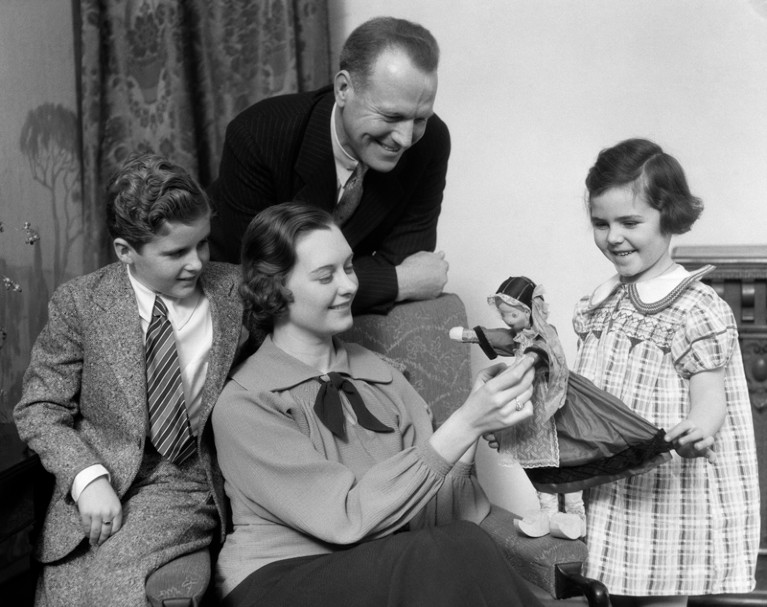
An older father and younger mother seems to have been a common combination for thousands of years.Credit: H. Armstrong Roberts/ClassicStock/Getty
Men have consistently had children later in life than women throughout human history, suggests a study. The research used genetic mutations in modern human DNA to create a timeline of when people have tended to conceive children over the past 250,000 years1, since our species first emerged. The timeline suggests that men have, on average, conceived children around seven years later then women.
Without historical records, knowing at what point in their lives people had children is tricky. In recent years, sequencing technologies and large genetic data banks have allowed researchers to mine DNA for clues. But previous estimates have been limited to approximately the past 40,000 years2,3. To look further back in time, Richard Wang, an evolutionary geneticist at Indiana University in Bloomington, and his colleagues tracked spontaneously arising mutations in modern human DNA.
All children have new mutations that their parents don’t. These mutations emerge when DNA becomes damaged before conception, or owing to random errors during cell division. Research suggests that older parents pass on more mutations than younger parents, with differences between men and women.
Mutation tracker
Wang and his colleagues used software to comb through data from a study of around 1,500 Icelanders and their parents that tracked age of conception and genetic changes between three generations4. The program learnt to associate certain mutations and their frequencies with the age and sex of parents. The team then applied the newly trained model to the genomes of 2,500 modern people living around the world, to identify mutations that emerged at various points in human history.
By dating when these mutations emerged, the team was able to map out the average age of mums and dads over the millennia. The researchers found that 26.9 years was the overall average age of conception during the past 250,000 years. But breaking this down by sex showed that men averaged around 30.7 years when they conceived a child, compared with 23.2 years for women. The numbers fluctuated over time, but the model suggested that men consistently had children later in life than women.
The longer generation times for men can be generally explained by the fact that men are biologically able to have children later in life than women, bringing up the average age of fatherhood, says Wang.
Social pressure
The finding could also point towards social factors, says Mikkel Schierup, a population geneticist at Aarhus University in Denmark, such as pressure on men in patriarchal societies to build status before becoming fathers.
Population geneticist Priya Moorjani of the University of California, Berkeley, says the model doesn’t account enough for other factors — including environmental exposure — that could shape when mutations pop up. This means that mutations with various causes might be unfairly attributed to the age of parents, potentially skewing the results of studies like this, Moorjani and others argued in a preprint posted in June5.
Although this is a valid concern, Wang says that his team’s study does account for some other mutation-causing factors. Definitively reconstructing when people became parents will require sampling more populations, says Schierup. In the meantime, this study provides “sensible estimates” that can help researchers to gain insight into the lives of early humans, he says.

